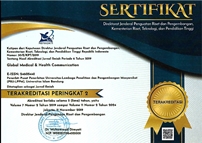The Source of Stress of Students During Pandemic COVID-19: a Qualitative Study
Abstract
The COVID-19 pandemic can lead to students' mental health problems, such as anxiety, depression, and stress. The government's policy for study from home exacerbates mental health problems. This study aimed to determine the source of student stress during the study from home during the COVID-19 pandemic. The study design used qualitative research. The sampling technique uses consecutive sampling. This research involved 36 students from the faculty of psychology and the faculty of medicine in Bandung city who underwent study from home (SFH). Data were collected by interviewing participants in May 2020. This study's results are the dominant thing that participants feel during the study from home is boredom, relaxed, and complicated; the things they missed during learning at home were friends, playing, and chatting; and they feel fear, sadness, and anxiety when heard the news about COVID-19. This study concludes that the source of student stress was being far from friends, limited communication and face-to-face contact with friends and lecturers, and did not get direct attention from friends or lecturers.
SUMBER STRES MAHASISWA SELAMA MASA PANDEMIK COVID-19: PENELITIAN KUALITATIF
Pandemik COVID-19 dapat mengakibatkan masalah kesehatan mental untuk mahasiswa seperti kecemasan, depresi, dan stress. Kebijakan pemerintah untuk melakukan pendidikan jarak jauh (PJJ) telah memperburuk masalah kesehatan mental. Tujuan dari penelitian ini adalah untuk menentukan sumber stres mahasiswa selama menjalani PJJ di masa pandemik COVID-19. Desain penelitian ini adalah penelitian kualitatif. Metode pengambilan sampel adalah consecutive sampling dengan melibatkan 36 mahasiswa dari fakultas psikologi dan fakultas kedokteran di Kota Bandung yang menjalani PJJ. Data diambil dengan melakukan wawancara kepada partisipan pada bulan Mei 2020. Hasil dari penelitian ini adalah perasaan dominan yang dirasakan partisipan selama PJJ adalah bosan, santai dan tidak praktis; hal yang dirindukan selama masa kuliah di rumah adalah teman, bermain dan mengobrol; dan hal yang terlintas ketika mendengar berita tentang COVID-19 adalah takut, sedih dan cemas. Kesimpulan dari penelitian ini adalah sumber stres mahasiswa adalah merasa jauh dengan teman, komunikasi dan kontak tatap muka dengan teman dan dosen yang terbatas serta tidak mendapatkan perhatian langsung dari teman dan dosen.
Keywords
Full Text:
PDFReferences
Wang ZH, Yang HL, Yang YQ, Liu D, Li ZH, Zhang XR, et al. Prevalence of anxiety and depression symptom, and the demands for psychological knowledge and interventions in college students during COVID-19 epidemic: a large cross-sectional study. J Affect Disord. 2020;275(1023):188–93.
Liu S, Yang L, Zhang C, Xiang YT, Liu Z, Hu S, et al. Online mental health services in China during the COVID-19 outbreak. Lancet Psychiatry. 2020;7(4):e17–8.
Worldometer. COVID-19 coronavirus pandemic [Internet]. 2021 April 11 [cited 2021 April 11]. Available from: https://www.worldometers.info/coronavirus.
Ravesloot, Ward B, Hargrove T, Wong J, Livingston N, Torma L, et al. Why stay home? Temporal association of pain, fatigue and depression with being at home. Disabil Health J. 2016;9(2):218–25.
Wahed WYA, Hassan SK. Prevalence and associated factors of stress, anxiety and depression among medical Fayoum University students. Alexandria J Med. 2017;53(1):77–84.
Cheung D, Tam KY, Tsang H, Zhang LW, Lit SW. Depression, anxiety and stress in different subgroups of first-year university students from 4-year cohort data. J Affect Disord. 2020;274:305–14.
Bolinski F, Boumparis N, Kleiboer A, Cuijpers P, Ebert DD, Riper H. The effect of e-mental health interventions on academic performance in university and college students: a meta-analysis of randomized controlled trials. Internet Interv. 2020;20:100321.
Sayeed A, Kundu S, Al Banna MH, Hasan MT, Begum MR, Khan MSI. Mental health outcomes during the COVID-19 and perceptions towards the pandemic: findings from a cross sectional study among Bangladeshi students. Child Youth Serv Rev. 2020;119:105658.
Xiang YT, Yang Y, Li W, Zhang L, Zhang Q, Cheung T, et al. Timely mental health care for the 2019 novel coronavirus outbreak is urgently needed. Lancet Psychiatry. 2020;7(3):228–9.
Cullen W, Gulati G, Kelly BD. Mental health in the COVID-19 pandemic. QJM. 2020;113(5):311–2.
Wang C, Pan R, Wan X, Tan Y, Xu L, Ho CS, et al. Immediate psychological responses and associated factors during the initial stage of the 2019 coronavirus disease (COVID-19) epidemic among the general population in China. Int J Environ Res Public Heal. 2020;17(5):1729.
World Health Organization. Mental health and psychosocial considerations during the COVID-19 outbreak [Internet]. Geneva: World Health Organization; 2020 [cited 2021 January 20]. Available from: https://www.who.int/docs/default-source/coronaviruse/mental-health-considerations.pdf.
Ozbay F, Johnson DC, Dimoulas E, Morgan CA, Charney D, Southwick S. Social support and resilience to stress: from neurobiology to clinical practice. Psychiatry (Edgmont). 2007;4(5):35–40.
Townsend SSM, Kim HS, Mesquita B. Are you feeling what I'm feeling? Emotional similarity buffers stress. Soc Psychol Personal Sci J. 2014;5(5):526–33.
Marthoenis, Meutia I, Fathiariani L, Sofyan H. Prevalence of depression and anxiety among college students living in a disaster-prone region. Alexandria J Med. 2018;54(4):337–40.
Vitasari P, Wahab MNA, Herawan T, Sinnadurai SK. Psychophysiological treatment in reduced anxiety with biofeedback training for university students. Procedia Soc Behav Sci. 2011;30:629–33.
Mustafa S, Melonashi E, Shkembi F, Besimi K, Fanaj N. Anxiety and self-esteem among university students: comparison between Albania and Kosovo. Procedia Soc Behav Sci. 2015;205:189–94.
Respati T, Irasanti SN, Sartika D, Akbar IB, Marzo RR. A nationwide survey of psychological distress among Indonesian residents during the COVID-19 pandemic. IJPHS. 2021;10(1):119–26.
Respati T, Nugroho E, Setijono GW. Promoting health and brand awareness-an overview of integrated gamification approach on corporate sector. Pertanika J Soc Sci Hum. 2018;26(T):113–24.
Marzo RR. Ismail Z, Nu Htay MN, Bahari R, Ismail R, Villanueva EQ III, et.al Psychological distress during pandemic Covid-19 among adult general population: result across 13 countries. Clin Epidemiol Glob Health. 2021;10:100708.
DOI: https://doi.org/10.29313/gmhc.v9i1.6938
pISSN 2301-9123 | eISSN 2460-5441
Visitor since 19 October 2016:
Global Medical and Health Communication is licensed under a Creative Commons Attribution-NonCommercial-ShareAlike 4.0 International License.































.png)
_(1).png)
_(1).jpg)
